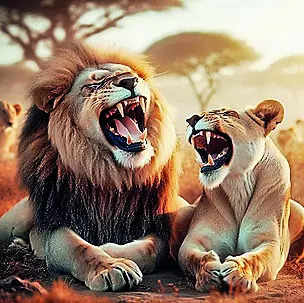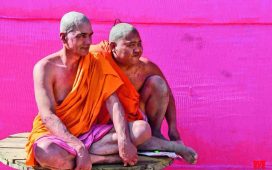
Last Thursday, responding to a petition, Calcutta High Court asked the state government to change the lion and lioness’ names. What is odd is not that Justice Saugata Bhattacharya wanted to know whether state additional advocate general Debjyoti Choudhary would have named his own pet after ‘some Hindu god or Muslim prophet’ – adding as any good Bengali for the benefit of another good Bengali would, ‘Can anyone of us think of naming an animal after Rabindranath Tagore?’
What is odd is that just a day earlier, Bhattacharya had said that the lioness may well have been named ‘Sita’ affectionately. ‘How does it matter?’ was his exact remark.
Then, a day later, the man flips – his decision, that is. Bhattacharya ‘explains’ that over the night, he had thought the issue over and figured that animals shouldn’t be named after deities, mythological characters, freedom fighters, and in the case of Akbar the lion, after an ‘efficient, successful and secular Mughal emperor.’
What could have happened overnight that made Bhattacharya change his mind? Entering his Solomonic mind, one can only speculate:
It would only be right to ask the two lions what they’re real names are. Or, what they would like themselves to be called. If the petition finds it problematic for a non-human to be named ‘Sita’, is it because the petitioners find lions – and by extension, all non-human animals – to be not god’s creation? And if that is the case, who made lions? Would it be okay for an AI chatbot to be called, say, ‘Hanooman’? If I find the safari park authorities guilty of naming two fine specimens of Panthera leo after one respected and another revered human, should I drag iconic writer, Bengali to boot, Saratchandra Chattopadhyay, and change the title of his story, ‘Mahesh’ – another name of Shiv – which is also the name of a buffalo in the story, that too owned by a poor Muslim farmer?
Since the naming of the two lions were actually done in 2016 and 2018 by Tripura Zoo authorities, should we check what other names they may have given to other non-human animals before carting some of them off to different parts of the country spreading nomenclatural haraam?
Like Gregor Samsa, Saugata Bhattacharya must have woken up from uneasy dreams, not to find himself transformed in his bed into a gigantic insect, but as a judge who suddenly saw it fit to have a change of heart and order a change of names. ‘You could have named it ‘Bijli,’ or something like that,’ he said, once fully awake and back in court that day.
Fair point. The lions could have even been called ‘Bunty’ and ‘Babli’ to avoid the mere potential of humans feeling humiliated. But there’s that story of Ramakrishna Paramhansa – someone the petitioners as well as the judge must have heard of – retelling how he had once fed a cat on the premises of Kolkata’s Dakshineswar Kali Temple, food meant to be offered to the goddess. ‘I clearly perceived that all this was the Divine Mother – even the cat.’
The temple garden’s manager, however, complained to a patron, saying the mystic was insulting holy ritual by feeding prasad to a cat. But the patron, in Ramkrishna’s words, ‘having insight into the state of my mind’, wrote back to the manager: ‘Let [Ramkrishna] do whatever he likes. You must not say anything to him.”
Meanwhile, back in the here and now, the state’s additional advocate general assured the judge that the names of the lions will be changed. As a result, grievous harm to the nation has been averted, justice served, two innocent animals of uncertain religious persuasion have been saved from human opprobrium or worse.









